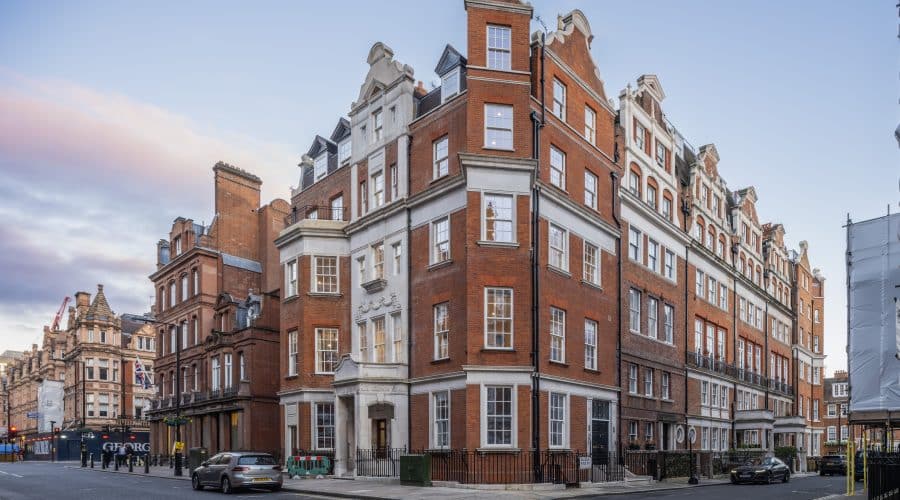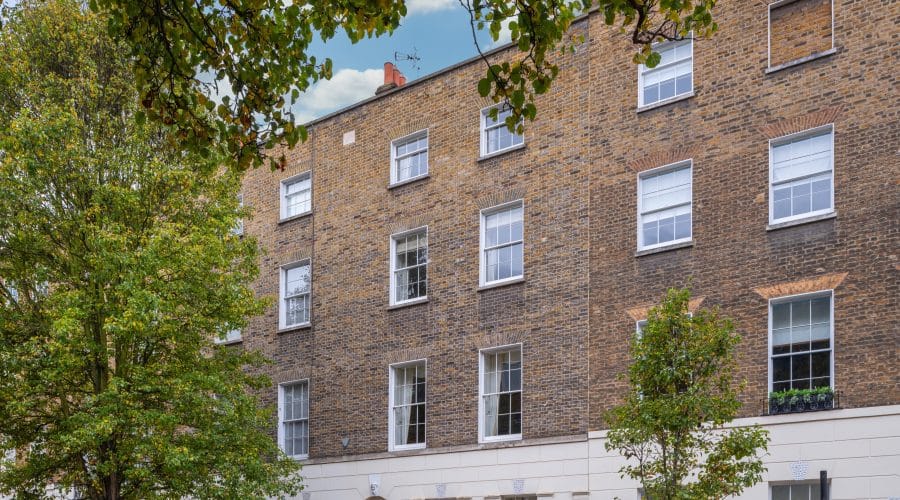ON INTERNATIONAL WOMEN’S DAY, RUTH BLOOMFIELD MEETS WOMEN AT THE TOP IN LONDON HOUSING
From the boardroom to the building site, women are woefully under-represented on London’s housing scene. Less than one third of practising architects are women, while just 14 per cent of the construction workforce is female – and many of the nation’s major housebuilders have yet to admit a woman to their upper echelons.
So, on International Women’s Day, Metro is celebrating seven women who have smashed their way through the glass ceiling – and whose work is redefining where and how we live…
THE HOUSEBUILDER – Morwenna Hall is used to being a woman in a man’s world. She studied mechanical engineering at Bristol University, one of six female students in a class of 70. Today, the 39-year-old is chief operating officer and the only female partner at developer Argent, which spearheaded the regeneration of King’s Cross. She was responsible for Coal Drops Yard, the spectacular shopping destination and foodie hotspot which opened there in 2018.
She is now working on a £5billion redevelopment at Brent Cross Town in north London, which will feature 6,700 new homes and three million square feet of office space. It will, by 2030, be zero carbon and is likely to feature the type of landmark architecture that sets the new King’s Cross apart.
‘People seek out delightful experiences that stimulate their senses,’ says Morwenna. ‘Architecture is so important for this as not only does it create spectacles that are visually appealing, but it helps create places that enable a variety of uses and activities through incredible sounds, smells, tastes and textures, like planting and water play.’
She believes the reason women are so outnumbered in her industry is lack of information. ‘Lots of young women and girls are unaware of the job opportunities in housing and development, let alone encouraged into them,’ she said. ‘I spent quite a bit of time in my twenties and early thirties visiting schools to talk about my passion for and experiences in the built environment, but this is an industrywide imperative.’
Now her own career is flying high, Morwenna feels that it is her responsibility to champion other women.
‘I am very proud that in my role as COO, I have helped us transition to become a business where 50 per
cent of our heads of department are women,’ she said. ‘However, we know we still have much more to do to be a truly diverse organisation.’
THE BROKER – Over the past 27 years the Canary Wharf Group has redefined London’s second
financial centre into a viable place to live. And Katy Kingston, as managing director, legal, has helped broker the billions of pounds worth of funding required to make this change. The 46-year-old, who lives in Farnham, Surrey, has worked for the group since 2014 and while she has noticed female representation in the sector improving, thanks to innovations such as flexible working and mentoring schemes, she agrees more work needs to be done.
An example of this work is the ‘junior board recently set up by Canary Wharf Group to nurture the next
generation of talent. ‘I hope this emboldens young women to feel represented and heard,’ she says.
THE ESTATE AGENTS – Fifteen years ago Camilla Dell set up her own company, Black Brick, to help
buyers find their dream homes.
Camilla earned her property stripes working for Foxtons an for Knight Frank, but a distinct lack of female role models at most of the the major estate agent brands made her feel her chances of progression were limited. ‘When I was at Knight Frank, only one of the proprietary partners was a
woman, and I just thought, What are my chances? And I had always wanted to be the boss and do my own thing.’
Camilla, 44, lives with her family in South Hampstead and is now considered one of London’s leading
buying agents. Black Brick has done deals worth more than £1billion, including the recent sale of a Surrey country house worth close to £30million. She feels that being a woman has advantages in the
buying agency business.
‘I can do the facts, figures and numbers and I can empathise with buyers, which is important when they’re looking for a home rather than investment.’
When she was studying art history at Oxford it is likely that Emma Mansell dreamed of becoming an estate agent. But the company she leads is no ordinary agency.
The Modern House has carved a profitable and high-profile niche by curating a collection of ultra-stylish and beautifully photographed contemporary homes for sale.
Emma joined the firm in 2016, after an early career in the art world, including a stint at the Wallace
Collection. Back then the firm had nine employees. It now has more than 70 and Emma was made managing director last year, leading the launch of the firm’s sister company, Inigo, which specialises in equally stylish traditional homes, and its print and online magazine.
‘Our editorial output has always distinguished us from other estate agencies and helped us nurture a
community of people who are united by their love of good design,’ says Emma, who is in her early thirties and lives in south-east London.
‘I’d love our audience to use our platform for inspiration on how to make homes more sustainable, too. It
is essential that we are all looking to make these changes in whatever ways we can. We want to be the place where design and sustainability come together.’
THE LOW-COST HOUSING PROVIDER – After an early career in local government Kate Davis switched to social housing. She became chief executive of Notting Hill Genesis, one of London’s largest providers of low-cost housing, and a major force in new homebuilding, in 2014.
NHG has a portfolio of 67,000 homes and an annual turnover of £1billion, and Kate, who is in her sixties and lives in Paddington, works 50 to 60 hours in a normal week, and is on call 24/7 to deal with emergencies. She spends her spare time with family and friends, travelling and doing yoga. ‘I feel my life is balanced,’ she says.
During her tenure, Kate has faced some challenges, most notably when eight of Notting Hill’s tenants died in the Grenfell Tower disaster. The association has been caught up in the ensuing cladding crisis, spending ‘millions’ on dealing with fire safety upgrades to its own buildings.
She feels the approach to the crisis has been wrongheaded – that repairs should have been carried out on the most dangerous buildings first, with those paying the bill to include ‘government, the cladding
manufacturers, the building industry, the freeholder, insurers, and–in specific circumstances – the leaseholder’.
Another issue that worries Kate is shared ownership, the low-cost housing option pioneered by Notting
Hill in 1979. ‘It is too expensive for many of London’s key workers, because we get little grant and land
and housebuilding in London is very costly,’ she said. ‘I would [like to] make public sector land available free to housing associations. The 30 per cent reduction in the cost for the first-time buyer would be held
in trust by the association and recycled to the next person when the house is sold.’
THE CAMPAIGNER – Anya Martin first became interested in property when working as a housing assistant at a university. ‘I was exposed to the very worst end of renting, and became quite passionate
about it,’ she says.
Anya works as a research manager for a charity, but in her spare time she is director of pressure group Priced Out, which wants the Government to act to reduce the price of housing. ‘The biggest problem we have is a lack of supply,’ says Anya, 29, who rents in Brixton. ‘We have a lot of people competing for very few properties, and obviously the impact of that is that prices go up.
’Priced Out is looking for planning reform to make it easier to build homes for sale and rent in high-demand areas such as London, although it faces plenty of push-back from local groups who oppose
overdevelopment.
However, Anya says: ‘Generally there does seem to be a greater recognition that you can’t solve the
housing crisis without building more homes.’
For the most part, she says, being a woman hasn’t caused her any particular issues, although social
media’s keyboard warriors can descend to sexist slurs. ‘They call me a silly little girl, and things like that, because I disagree with them,’ she says. ‘I have just learned to ignore them or block them.’
THE ARCHITECTS – Deborah Saunt co-founded London architects DSDHA in 1998. She and her co-founder and husband David Hills built parts of the Olympic Village at Stratford, revamped the streets
around Tottenham Court Road and created their own amazing concrete home in Clapham, picking up 19 Royal Institute of British Architects awards along the way.
‘My practice specialises in rejuvenating underappreciated places,’ she explains. ‘It’s about being a catalyst for enhancing people’s lives, such as our reimagination of the National Youth Theatre in Islington which now brings some Broadway glamour and joy to everyone on the Holloway Road.’
Deborah, 56, saw the downside of being a woman in architecture as her career began to take off. ‘I was shocked how uncomfortable some of the older men were at seeing me in their midst; one of them confronted me with, “What are you doing here? This is for the big boys,” she says. ‘There were also unkind remarks about my gender being a factor in winning work, even though the practice was
winning awards and had won competitions fair and square.’ To her disappointment, this kind of
treatment has driven some women out of the profession; others are deterred by the long and expensive training.
Deborah helped set up the London School of Architecture, which encourages students from a diverse range of backgrounds to combine study with work. But she wishes developers, too, would think outside of the box.
‘In the main, it’s still the ‘big boys’ who win major projects because, typically, architects have to prove they have completed a number of previous similar projects to qualify, and developers tend to be risk averse.’
Katerina Dionysopoulou worked for some of the biggest names in British architecture – Lord Foster and
Thomas Heatherwick – before setting up Bureau de Change architects with Billy Mavropoulos, a friend from her Foster + Partners days.
The firm has designed private homes and extensions as well as shops, hotels and an upgrade of the
British Film Institute on the Southbank.
Katerina, 46, lives in Barbican with her husband and their four-year-old, and decided to go it alone because she wanted to pick and choose what she worked on and have complete control. ‘It is about
doing stuff that you fully believe in,’ she says.
She experienced plenty of everyday sexism along the way. ‘When I was doing the British Pavilion at the Shanghai Expo for Thomas, people would go to him behind my back, because perhaps they thought I
wouldn’t understand.’ She says she politely disregards ignorance and tolerates mansplaining.
‘You have to be a little bit oblivious and not let it hurt you,’ she says. ‘It is about achieving what you want at the end of the day.’














